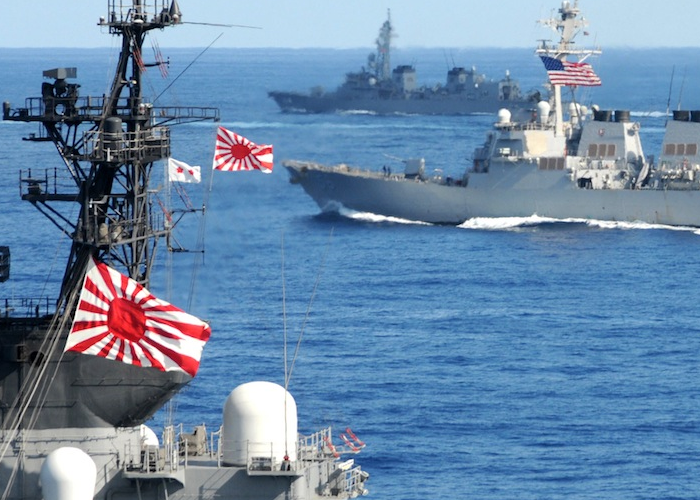Prime Minister Shinzo Abe has now met with Okinawa governor Takeshi Onaga over his staunch opposition to the relocation of the U.S. Marine Corps Air Station Futenma. They seem to have had a good conversation but were not able to accomplish anything by it. Additionally, it seems difficult to see how an agreement can be reached as Onaga and his supporters oppose any relocation of Futenma base as well as the continued existence of the base at Futenma at all. He claims, of course, that he understands the importance of the Japan-U.S. alliance but I have my doubts about this. Certainly, the stand-off is presenting a bad public image leading up to the unprecedented visit of Prime Minister Abe to the United States to address a special joint-session of Congress. There is quite a bit that can be seen, 'reading between the lines' about this visit and the background stand-off over the Futenma air station.
Prime Minister Abe is the first Japanese leader to be invited to address the U.S. Congress and is a clear sign of American support for the Abe administration and his policy of strengthening the Self-Defense forces and reinvigorating Japanese leadership in East Asia. This military build-up has long been an idea that the U.S. government has favored (an admission of the mistake American officials made at the end of the war in the drawing-up of the current constitution). The special invitation of Prime Minister Abe to address Congress has also not gone unnoticed by the leaders of the bandit regime in China, nor are they ignorant as to the message this is sending on the part of the United States concerning the strengthening of Japan. Undercover investigations have shown that the Chinese Communist Party has been the major supporter of the opposition on Okinawa to the U.S. military presence. Not all of the people who join the protests are going along with this or are even aware of it but they are what the dictator Joseph Stalin called "useful idiots", which is to say, people who are helping a cause out of ignorance to its true purpose. It is clear that this is the case because the long-standing and obvious goal of Communist Chinese policy has been to isolate and so weaken Japan.
The Communist Party leadership knows as well as anyone that so long as the U.S.-Japan alliance exists, they cannot touch Japan. They also know that if the Japanese people demand or can be influenced to demand the removal of U.S. military bases, the Americans will pack up and leave. This is exactly what happened in The Philippines though, lately, the Filipino government has requested U.S. military forces to return due to the increased aggression and expansionism of China. However, there was a certain loss of solidarity there, because of the eviction of U.S. forces, that still lingers. The United States is the only official ally that Japan has and the CCP, more than anything else, wants this alliance to end. It is for the same reason that they have backed secessionist movements in the Ryukyu Islands, as far-fetched as they are, because if these were successful that would also be a means of getting rid of the U.S. military bases and a major block to their goal of economic and military domination of East Asia. No other power in the region is strong enough to oppose them so they are working on two fronts: militarily and economically; building up each so that no country will be strong enough to oppose them or that no country can afford to oppose them.
The dispute over military bases on Okinawa plays perfectly into the hands of the CCP, encouraging anti-American sentiments in Japan, which is shown in the United States in the form of the protesters and which then creates mistrust of Japan on the part of Americans. They can make use of local issues, local self-interest but it all serves their overriding goal of creating division which, if carried on, would, they hope, lead to the loss of a major strategic partner for the United States and the loss for Japan of their only official ally and the protection of the world's leading military. They are also, of course, always busy trying to buy influence and support with the politicians of both countries as well to further their goals. It is the classic "divide and conquer" strategy which people of goodwill on both sides of the Pacific must work to resist.



No comments:
Post a Comment